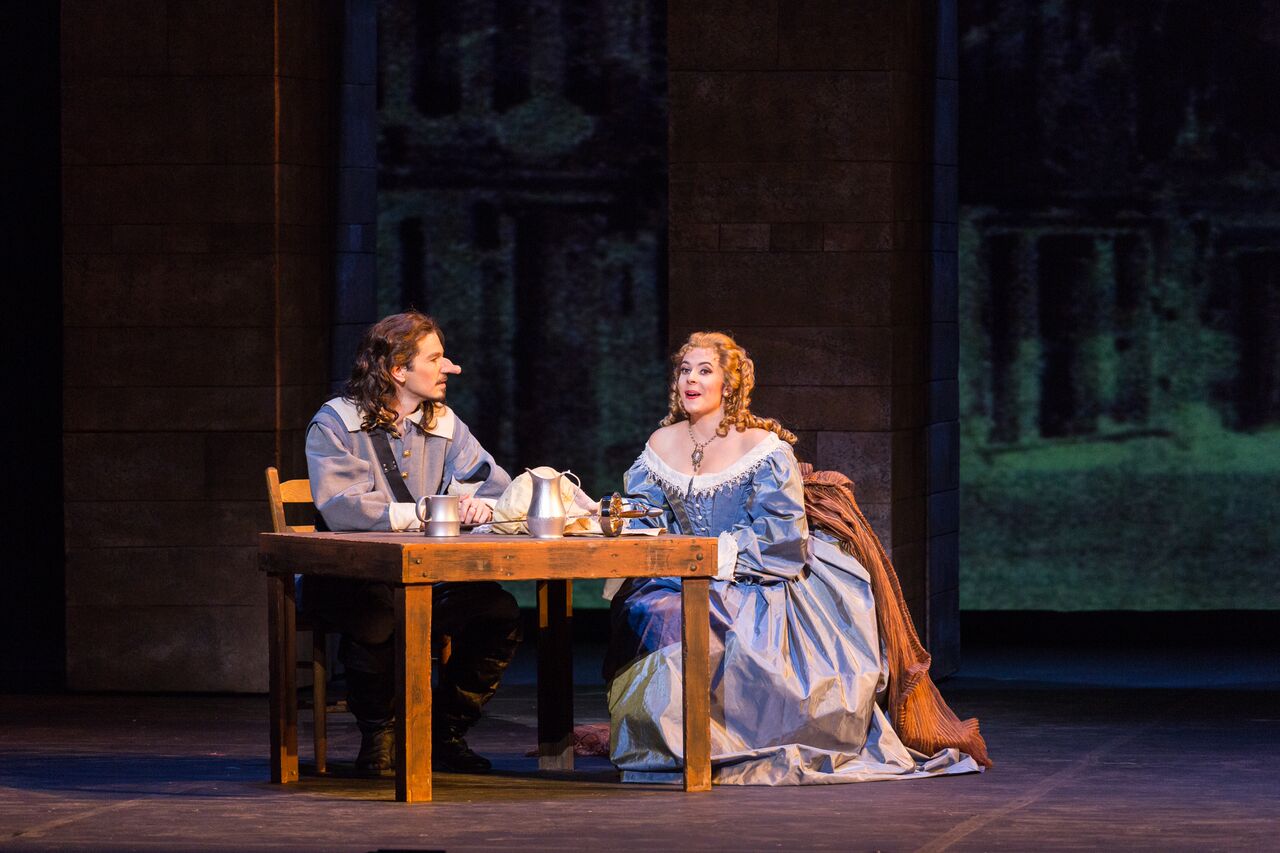Although unplanned, a mini-festival of sorts occurred in North Carolina last fall, where the state’s three largest professional companies gave the state premieres of recently composed operas. In a six-week period, audiences could choose from Jennifer Higdon’s 2015 Cold Mountain (Raleigh’s North Carolina Opera), Kevin Puts’s 2011 Silent Night (Winston-Salem’s Piedmont Opera), and David DiChiera’s 2007 Cyrano (Charlotte’s Opera Car olina). This unusual alignment allowed an instructive look at the current state of contemporary opera composition and production.
While North Carolina Opera’s effective pres entation of Cold Mountain (reviewed J/F 2018) used the full design elements from the work’s Santa Fe premiere , Silent Night and Cyrano were new productions redesigned specifically for the local companies’ smaller halls.
Pulitzer Prize-winning Silent Night has had great exposure since its Minnesota Opera premiere; Piedmont Opera’s was the work’s 12th production. Its popularity stems from its moving storyline about the 1914 Christmas Eve truce in World War I that brought together enemy soldiers for one night of camaraderie.
Puts’s score is purposely eclectic, employ ing separate colors and moods for each group of soldiers, along with cinematic orchestration in battle sequences. His choral writing is lovely (especially the soldiers’ ‘Sleep’ chorus); and he adroitly captures atmosphere, such as an omi nously quiet dawning. Puts makes good use of Mark Campbell’s libretto (five languages), cre ating astutely individualized characterizations. But the dialog often falls into regular, somber patterns, causing sluggishness even in scenes of high tension or occasional humor. Still, the score and libretto maintain interest.
At the third Piedmont Opera performance on October 31, James Allbritten guided the Winston-Salem Symphony through the many shifts of dynamics and musical styles with complete control, the players impressively precise.
Major roles were engagingly cast, some times more so than in the Minnesota Opera premiere. Baritone Gabriel Preisser, who sang Scottish Lt Gordon in Minnesota, seemed per fect for French Lt Audebert. His warm voice and quietly emotional acting set the bar for other cast members. Lt Gordon was played by Gregory Gerbrandt, whose fearless demeanor and robust baritone limned a formidable but understanding commander . Baritone Brian Banion as German Lt Horstmayer projected impatient gruffness outwardly but revealed a tender, war-weary heart underneath. The three played off each other gratifyingly when warily deciding on the truce and, later, dealing with burying their dead.
Puts and Campbell balanced gritty war zone scenes with the love story of German opera singers Anna and Nikolaus, who wei;e separated when Nikolaus was drafted. Tenor Kirk Dougherty, who sang Nikolaus last season with Opera San Jose, embodied Nikolaus’s dis gust with his country’s warmongering and per formed the “on stage” operatic scenes with heightened intensity. Jodi Burns made Anna a true diva, displaying a strong soprano voice with noticeable metal. Burns tossed off power ful high notes in Anna’s a cappella ‘Dona Nobis Pacem’ at Mass and injected as much drama as possible into her unwieldy aria about mothers learning of their sons’ deaths.
Two other singers were audience favorites. Tenor Logan Webber as Jonathan, who had to leave his dying brother in no man’s land, was frighteningly intense as he vowed vengeance-a heart-breaking portrayal. Kyle Guglielmo as Ponchel, Lt Audebert’s aide-de camp, was amusingly warm-hearted while constantly thinking about his home and moth er. Guglielmo’s lyrical baritone and fine acting made the character’s accidental death most moving.
Piedmont’s physical production employed semi-abstract settings and projections, giving it a dreamlike quality. Norman Coates’s production design included barbed wire-topped mounds across the backdrop and movable open boxes that became trenches, hills, or officers’ quarters. A large irregular shape, like a torn letter, loomed over the stage on which were projected snow, village scenes, and battlefronts. Coates’s lighting added a palpable chill and dread shadows. Props and costumes from the Opera San Jose production rounded out the first-rate visuals. Stage director Cynthia Stokes artfully steered the large cast around.
David DiChiera’s Cyrano is the most recent attempt to turn Edmond Rostand’s play into an opera-a considerable challenge because it’s so operatic already. But the attraction is understand able, and DiChiera met the challeng e in many ways. After the 2007 premiere at Michigan Opera and later performances in Philadelphia and Florida, he made some revisions, and con ductor Steven Mercurio did some re-orchestration for the work’s return to Michigan Opera in May 2017.
As heard at the second Opera Carolina performance on November 9, the score is an unapologetic throwback to opera a century or so ago. Its romantic melodies and sweeping flourishes bring to mind Puccini, Richard Strauss, and Korngold. The strongest sections are the intimate scenes expressing delicate emotions, particularly in Act I when Cyrano thinks Roxanne is in love with him and in Act II when Cyrano speaks his heart to her in disguise. DiChiera can also work up rousing passages such as Cyrano’s vow to fight a hundred men and the duet for Cyrano and Christ ian agreeing to combine forces.
However, DiChiera, like Puts, often allows the dialog to fall into drawn-out, regular pat terns, slowing the pace and variety of expres sion. He also often separates dialog lines with lengthy orchestral underlining, further imped ing momentum. Even with the re-orchestra tion, many big moments are still too heavily orchestrated, drowning out voices. Neverthe less , the music overall is gratifyingly accessible and mellifluous. Steven Mercurio’s energetic conducting of the Charlotte Symphony kept things generally lively and was sensitive to the exquisite gauziness of the romantic scenes.
As Cyrano, John Viscardi, who sang the part in the Michigan revival, displayed a clear, well-supported baritone, not large but wonderfully expressive. His acting beautifully indicated the pain of unrequited love under all of Cyrano’s bravado. He was matched by Magali Simard-Galdes as Roxanne, whose brightly centered soprano gamely dealt with frequent leaping high notes. She was particularly adept at making the transition from flirtatious young girl to emotionally mature woman, devastated by Cyrano’s final revelation. Tenor Sebastien Gueze, who was Christian in the Michigan revival, had the right cocky swagger and, later, affectingly projected his realization that Roxanne didn’t love him for himself. His singing began rather rough but had settled down by his big third act aria acknowledging Cyrano as Roxanne’s true love.
Other standouts included Eric Johnston as the baker Ragueneau; Keith Harris as Le Bret, Cyrano’s best friend; and Ashraf Sewailam as the poet, Ligniere. Kyle Albertson, yet another veteran of the Michigan revival, sang DeGuiche with appropriately smarmy tone, his wooing of Roxanne verging on harassment. The un-credited sets were three units of archways and columns rearranged for each scene, with other pieces added on, such as a stage for Montfleury and a balcony for Roxanne. Michael Baumgarten’s lighting trans formed these into beautiful tableaus, along with his striking backdrop projections of 17th Century paintings and architecture. John Pascoe’s lovely original costumes for the 2007 premiere added further pleasing visuals. Stage director and librettist Bernard Uzan managed the crowds efficiently and kept our attention on the principals. One misstep was placing Cyrano across the stage from Roxanne in the balcony scene instead of under it, robbing that section of its close-proximity heartache.
The high attendance and audience response at all three North Carolina productions proved that there are, indeed, reasonable contemporary operas that appeal to performers, producers, and audiences alike.


